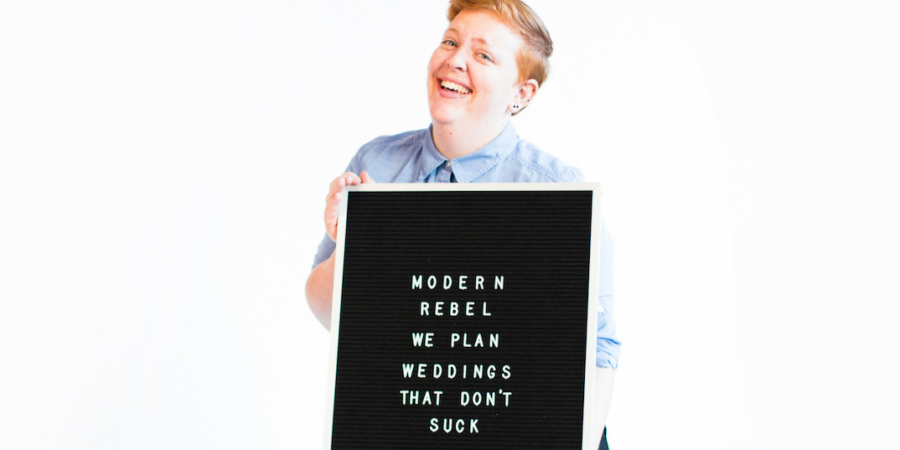Ainsley Blattel has had to come out twice in life: first as queer, and later, after a lot of self-discovery and gender exploration, as nonbinary.
After working in the nonprofit sector and discovering their passion for putting on events, Blattel — a hopeful romantic — decided to try their hand at wedding planning. They moved from the Bay Area of California to New York City, where they started working with wedding planners, but they were frustrated to learn how heteronormative the wedding industry was. Most of the focus was on white cis-male/cis-female couples, and Blattel wanted to work with queer people and others in communities who aren’t typically represented or supported in the wedding world.
When they found wedding planning company Modern Rebel, they knew they’d found their new home. With offices in New York, Washington, D.C., and Austin — and soon to be LA — Modern Rebel plans what they call “love parties” for anyone who doesn’t want a traditional wedding, with a focus on inclusivity for LGBTQ+ couples.
Blattel, 27, uses their experience as a queer person to help their clients navigate the wedding process and express their uniqueness. They love liberating their clients from having to use gendered terms like “bride” and “groom” and showing them that they can truly make the day their own in every way. They also enjoy matching their clients with vendors that don’t just tolerate them, but truly celebrate their love. And their clients have provided incredible feedback, saying how powerful it was to feel seen and heard by their wedding planner.
This is Blattel’s story of coming out as queer and then nonbinary, entering into the traditionally heteronormative wedding industry, and working to help LGBTQ+ couples plan their love parties.
Profiles in Pride: What was your journey to coming out as queer?
Ainsley Blattel: It’s funny, I don’t think I have a really strong coming out story, mostly because I think it was just a lifelong process. I knew from a young age that I wasn’t straight. I started identifying as bisexual when I was 13. In middle school I “dated” a girl; we hung out or whatever you do in middle school. There wasn’t a coming out around that — it was just like, “You’re cool, let’s hang out and make out.” So a lot of my friends knew from that point I wasn’t straight.
What I really consider my coming out was when I told my family. It took a lot longer than 13. I was 21 and studying abroad in Ghana for my senior year of college, and I fell so deeply in love with a woman I met there while in school. The problem was that she was Ghanaian and Catholic, so there wasn’t room for her to be anything but straight, even though we had an unofficial relationship for the 10 months I was there.
My mom was coming to visit me while I was studying abroad, so I needed her to understand the importance of her when she met her. I did what any person who doesn’t like conflict or any hard conversation would do: I wrote a blog post. I was like, “Hey Mom, you should read my latest blog post!” And she did. Even growing up in the Bay Area, it can be scary to say something like that. Also, I was kind of annoyed I even had to say anything at all. Why is the assumption straight until proven otherwise? It was a non-traditional coming out.
I’ve had a lot of conversations with my family since then. This summer I told my mom I identify as nonbinary and use they/them pronouns, and she’s been incredible with that. It’s been wonderful to have her work hard as an ally to understand my experience and the experiences of my friends. I’m really lucky that my brothers have been incredibly supportive as well.
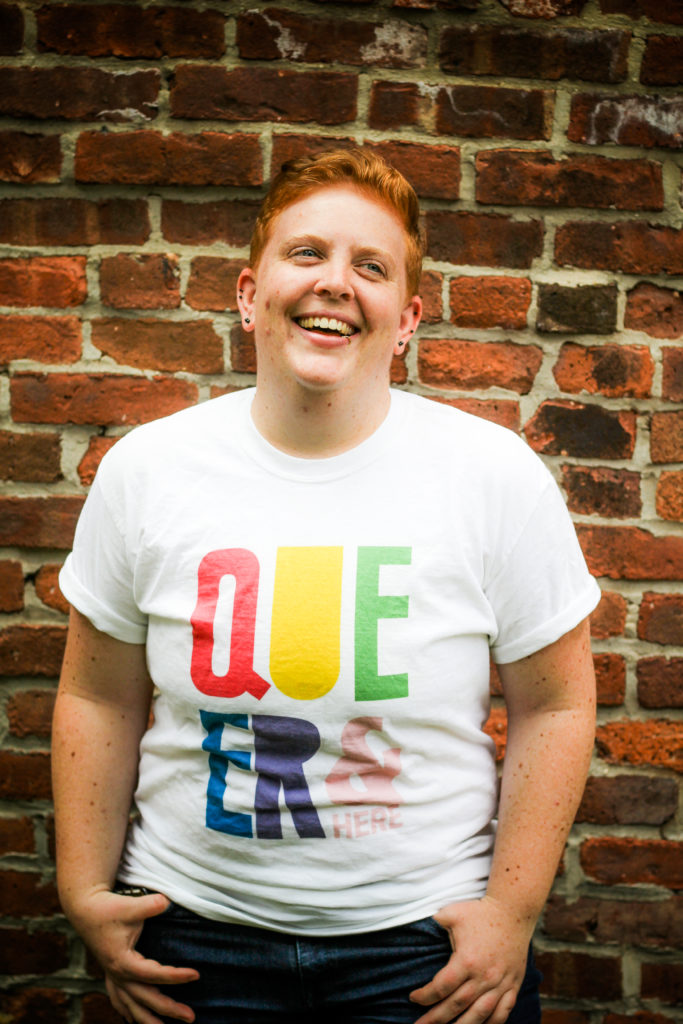
PIP: What was your process like of realizing you were nonbinary?
AB: I take a long time to make decisions and really think things through. I probably had my first inklings when I was in my early twenties, at which point I started dating a trans guy and told him, “I think I have some gender feelings. I see you wearing a binder and I didn’t know that was an option, and that really appeals to me.” But the challenge of that relationship, and part of the reason I left it, was there was a lot energy and effort spent on validating his gender and less on my own.
So I left and started to explore what I describe as my feelings about gender: if the sun is masculinity and the moon is femininity — because those are the things we typically associate with planets, and those are the binary there — I feel at once like the entire galaxy and also like a speck of dust. It’s been a process of trying to figure out what words feel best, and right now nonbinary is the best I have. I’ve really never felt quite at home with femininity and a female identity; it felt to me when I was doing it like kind of a performance.
With a lot of help from friends and community and therapy, I realized that nonbinary was an identity I could claim, and that was a valid term for me to hold onto. There can be a lot of fear of thinking, am I actually nonbinary? Am I nonbinary enough to use this label to identify myself? Are my gender feelings complicated enough? I finally just let myself say, “Yeah, they are.” If you’re not comfortable, if you cringe every time you hear someone say “she, her, girls, ladies,” find out what doesn’t makes you cringe and let people know that’s what you want to go for and feels good.
PIP: Absolutely. So how did you get into wedding industry and end up being a wedding planner for the LGBTQ community?
AB: It’s not something I ever planned on. I started doing events in college. I went to UC Santa Cruz, and I planned events for the campus there as a part-time job. After graduating I thought I’d do nonprofit work since that’s what I’d studied and was interested in. As I got into nonprofit work, I realized there are a lot of events, and a lot of fundraising and donor cultivation.
As I started getting pulled into that world, I realized I don’t like asking people for money; it makes me uncomfortable. But I like the events, because I think I’m really good at planning them. I’m a Virgo, so I have a passion for precision and details and logistics. But then I was trying to think, what events do I actually like? What motivates me? And it’s people.
More so than that, I have long identified as a hopeful romantic. I love weddings. I’ve planned a proposal for anyone I’ve ever dated. I have yet to follow through on them, but what excites me is people being like, “Holy shit you’re awesome, and I like you enough to spend a lot of time with you and I want to celebrate that.” That excites me. I got an internship in the Bay Area with a local wedding planner and assisted her and got to really dip my toes in. When I moved out to New York, I was assisting with some planners and trying to network. I finally found Modern Rebel, where I work now, and as soon as I found this company, I said, “This is it.”
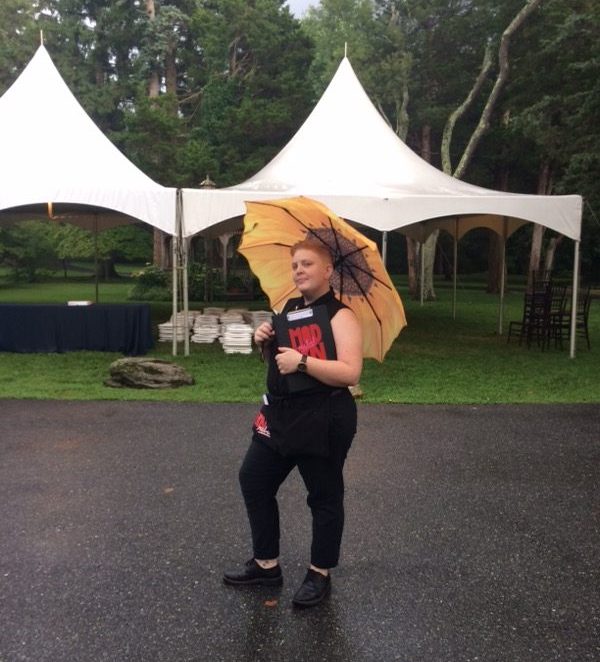
There’s definitely a picture that comes to mind when most people think of a wedding planner, and it’s not me. It’s someone you typically think of as very feminine presenting, probably white and thin, very pretty — probably looks like some stereotypical popular girl in high school. Right now I’m sitting in a flannel shirt with a jean jacket with all these buttons that say things like “I heart being queer” and “fight the cis-tem” and my they/them pronouns. This is who I am, and I don’t look like a lot of people expect.
I love what I do, because a wedding is a very particular moment in someone’s life where society has told us this is one of the few times we get to gather everyone we love in one place. As a queer person, marriage equality hasn’t been legal for that long at all. It feels so important for me to be able to bring that perspective to the wedding industry because there’s so much that needs to change.
When I get to work with queer couples and nontraditional couples, which is the bulk of our community at Modern Rebel, especially for the queer couples, to have them know that the person they’re working with not only sees them but understands them is huge. I’ve heard from our couples time and again, but especially the queer folks, that it’s important getting to work with someone who actually understands the challenges of navigating an industry that is steeped with the binaried bride and groom.
We’re throwing all the rules people think they know about weddings out the window. What do you want to do? How do I make this feel good and empowering for you and make sure you feel valued and seen?
PIP: Do you think the wedding industry is becoming more queer-friendly overall?
AB: Totally, I definitely do. I think being in New York, it’s also a great place because we’re such a hub of so much queerness. A few of the folks who come to mind when I think of wedding industry folks who are pushing representation forward are Catalyst Wedding Company, which is a wedding resource and blog. Dancing with Her is incredible and has blown up and is doing great work for queer women’s representation, because a lot of times patriarchal society filters down into every part of society, including queer communities. Sometimes gay men get featured, but queer women or nonbinary and genderbending folks don’t as much. I know some of the bigger resources are getting more progressive too.
I’m definitely a person who is more geared towards smaller community — the things that are built by the queer community for the queer community. I think those folks are our best resources and allies. I think Love Inc. is another incredible wedding blog, and H&H Weddings. The cool thing about the blogs is they do features, and they’ll include vendors who are LGBTQ-friendly because they’re working with these couples already, so those are great places to look to find people in your area since they do features from all over.
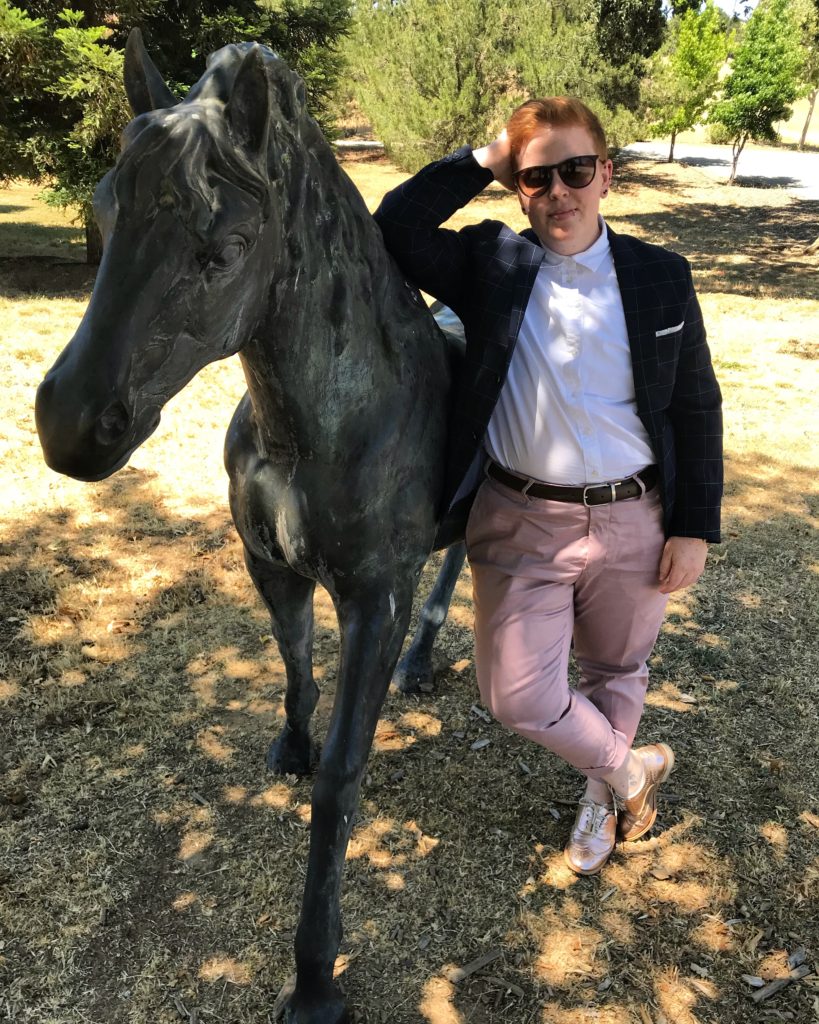
PIP: How does it benefit couples to hire a wedding planner for the LGBTQ community specifically?
AB: It really does matter that every single person understands you throughout the whole process. I think in terms of the ways we focus on being more inclusive, one of the biggest things we do is ask for pronouns first from all of our couples. We created our forms in a way that people actually get to pick what words feel best for them and how they identify. So all of our forms say bride/groom/individual A, bride/groom/individual B, and please identify your pronouns. Because not everyone identifies as a bride even if they are a cis woman; it’s a hugely loaded term with so much baggage, and not everyone feels comfortable with that.
Your wedding party can be called whatever feels best for you; it doesn’t have to be “bridesmaid” or “groomsman.” There are so many words, and I think just even opening people up to the idea that you can choose what feels best for you in that sense is really big.
Planners, venues, photographers, and caterers are often the first vendors people seek out. Typically most vendors will have a list of people they recommend working with. It’s really important for us at Modern Rebel to make sure all of our vendors are not only kick-ass people who are amazing at their jobs, but are also celebratory — not just tolerant, because I don’t believe tolerance is what we should strive for. Their website and Instagram has to feature all sorts of couples; they have to feature queer couples, people of color, people of all body sizes, and all different cultural and religious elements. We want to make sure when we’re recommending someone that they’re actually 100% on board to work with and celebrate all walks of life.
There are still so many folks in the wedding industry whose work really just shows straight white couples, and that’s not true of the people getting married. When you have a planner who’s guiding you through the day and helping you shape your understanding of what your event is going to look like, it’s important, especially for queer couples, to not have an officiant who will say, “I now pronounce you husband and wife.” That’s not what we’re doing here.
Instead, here’s a resource of alternatives. What else can we say? We can do your vows with a kiss. Maybe, “I now pronounce you married,” or “Congrats, you two did it!” There are so many other words we can use! A lot of times if your vendors aren’t aware of the options, they’re not going to say, “Here are some other ways we can do it that might fit for you.” Honestly, I think that should exist for straight couples, too. Not everyone fits into the same mold.
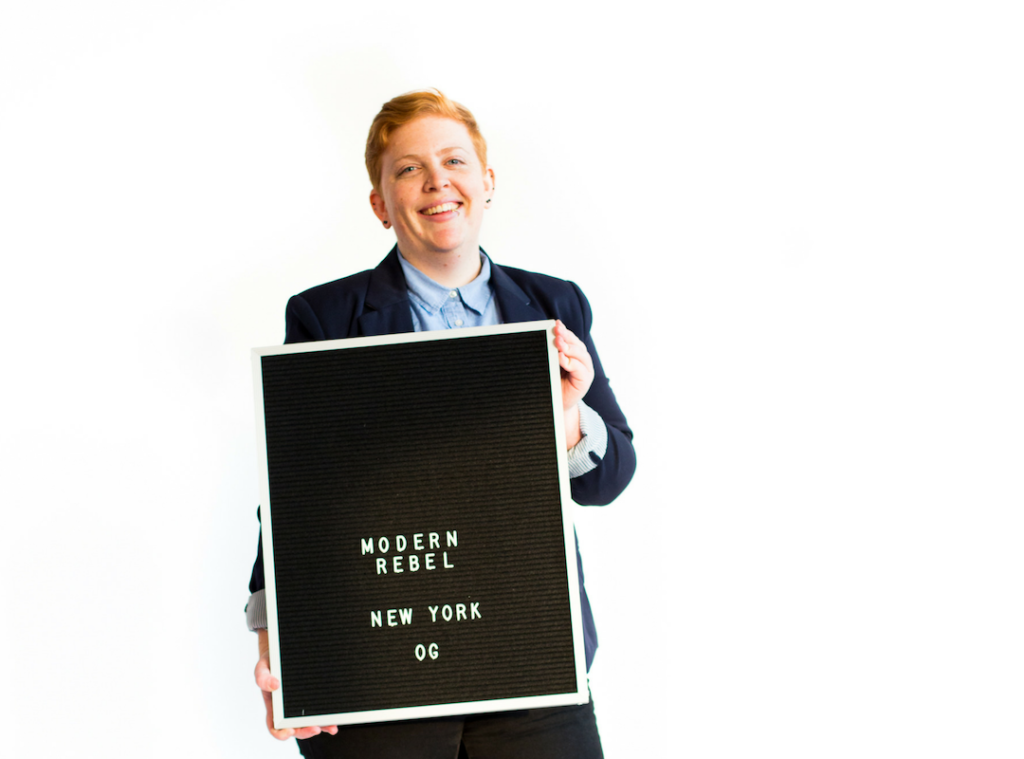
PIP: Absolutely. It’s amazing and refreshing to see more people doing nontraditional weddings and really making them their own.
AB: At Modern Rebel we call them “love parties” instead of weddings, because that’s really what it is, a love party! It’s a party celebrating love. It takes you off the hook a little bit, because there’s no pressure to have that one perfect day that weddings have been idealized as being. We can also say, “Fuck tradition, we can make this look however we want.” It lets people do what feels good for them, which can be so hard when we’ve all been fed this narrative and are expected to follow through with that.
I recently worked with a queer couple on Long Island, and on our form they identified as a wedding femme and a swiffer. I said, “OK, what is a swiffer?” The person, Dani, said they didn’t really identity as a bride or a groom. They said one of their friends, who is also masculine of center and uses she/her and they/them pronouns, said they were a combo of bride and groom: a broom.
Dani said, “I’m doing a play on that, I’m being a swiffer!” I thought, “This is great, I’m so excited about these two!” They were also an incredible team; part of their ceremony was they had these handwritten cards of gratitude for each and all 150 guests. They had their guests read them in the ceremony, and I got one. It was so intentional and beautiful, so to get that note from them…I was reading it for a while.
After the wedding when I sent a thank you email, they replied with this — I’ll read it verbatim: “You [and the other planner] made our day so much more spectacular than we could have ever imagined. We were so grateful for your support and guidance throughout this process. It was so meaningful to us that the person we work with really understood us. We felt so seen by you and the Modern Rebel team. So many people came up to us during and after to express how impressed they were by your hard work. You really worked your tail off.”
They went on to say something really sweet for me, which was, “While we know we can’t apologize for other people’s actions or behaviors, we want to pause to say we’re sorry that you were misgendered by our guests. We know how fundamental it is to be seen and valued, and we want you to know that we see you. Thank you for being you and for helping make our queer wedding so magical. It was so powerful to build a community and to feel we’d extended it by meeting you.”
That right there is the reason I do what I do. Because I get to be a part of these moments with people. It was a moment where this couple really felt seen and valued.
Keep up with Ainsley on Instagram @lazyandrogyny.

